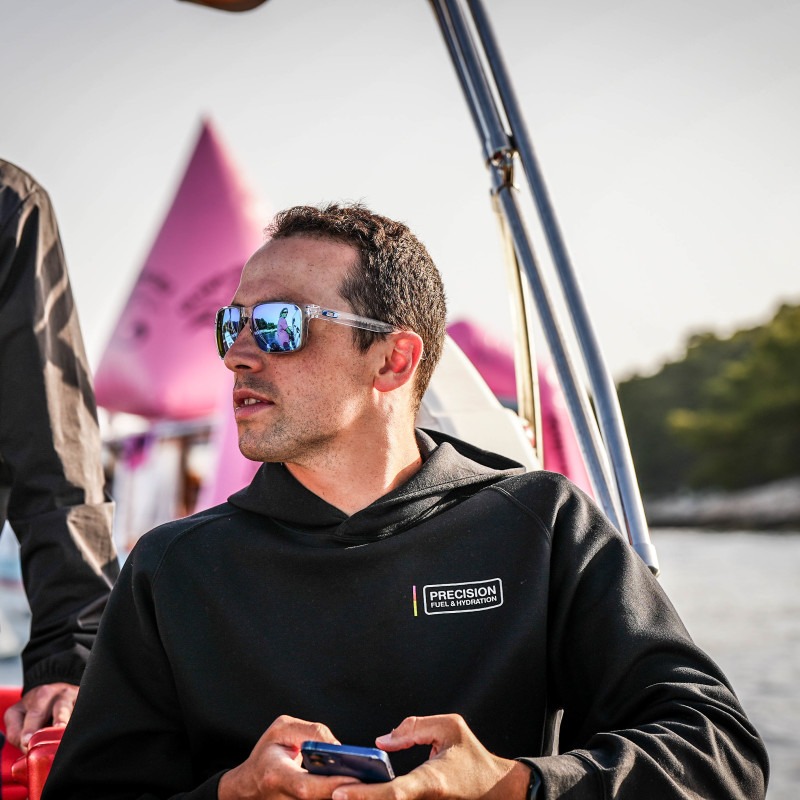
Chris Harris
Swashbuckler 70.3
Chris' headline numbers
Chris' strategy
Fueling
Carbohydrate is the main fuel you burn when racing. Failing to fuel properly is a leading cause of underperformance in longer races.
In terms of carb intake throughout the race, Chris averaged an impressive ~108g/h, including his time in the swim. He hit ~110g/h on the bike and an even greater ~120g/h on the run, which is unique to the usual trend of triathletes who frontload a lot of their carbohydrate intake on the bike leg. Compared to the general 90g/h recommendations, Chris averaged a significantly higher carbohydrate intake, supporting the emerging evidence which suggests athletes can absorb and utilise carbohydrates at rates of over 90g/h, usually by combining multiple transportable carbohydrates (e.g. glucose and fructose). Through doing so, Chris would have increased his carbohydrate availability and likely reaped the benefits within his performance. He managed this without any GI discomfort, largely due to a significant amount of time training his gut to tolerate this quantity of carbs.
Hydration
Taking on board an appropriate amount of fluid and sodium is essential to maintaining blood volume and supporting the cardiovascular effort needed to perform on race day.
Whilst the absolute amount of sodium and fluid consumed per hour is important, it’s critical to consider these in relation to each other. This is known as 'relative sodium concentration' and it’s expressed in milligrams per litre (mg/L). How much sodium you’re taking in per litre of fluid is more important than the absolute amount taken in per hour.
Sweat sodium concentration (mg/L) is largely genetically determined and remains relatively stable. Knowing how salty your sweat is enables you to replace a good proportion of your sweat losses, which can range from 200-2,000mg/L.
Given Chris’s losses are Very High (1,433mg/L), nailing his hydration strategy becomes especially crucial when it’s hot and/or humid.
Learn moreConsidering Chris has a sweat sodium concentration of 1,433mg/L, the relative sodium concentration of his drinks on the bike may first appear a little high, but he knew there weren’t many aid stations on the run course to pick up additional fluids and sodium. So, he treated the bike as an opportunity to preload for the run. In future, Chris could consider reducing his sodium intake on the bike and taking some Electrolyte Capsules with him on the run to keep his sodium intake more stable and mitigate the issue of dropping a bottle. During the run, Chris picked up cups of water from the aid stations to drink, and also poured several over his head to keep himself cool as temperatures rose to a soaring ~29℃ (84°F).
Caffeine
Beyond the Three Levers of Performance (carb, sodium and fluid), caffeine is one of only a few substances that is proven to improve performance for most endurance athletes as it can help stave off mental and physical fatigue.
Despite consuming two PF 30 Caffeine Gels on the run, it’s likely that due to his lower than ideal caffeine intake, Chris may have seen a reduction in his perceived effort in the latter stages of the hilly triathlon course. Next time, taking another caffeine hit earlier in the race to fall within the recommended range will help him reap more of the ergogenic benefits that the stimulant provides.
How Chris hit his numbers
Here's everything that Chris ate and drank on the day...
Chris' weapons of choice
Final thoughts
Chris' full stats
Data Confidence?
There is good confidence in the accuracy of the data reported. An athlete feels that the numbers closely reflect what they consumed despite a couple of estimations which may carry some degree of error. The majority of what was consumed is recorded to a high level of specificity (most volumes are known through the use of bottles brands quantities flavours). The numbers are very plausible and align with previous data recordings (if an athlete has collected data previously).